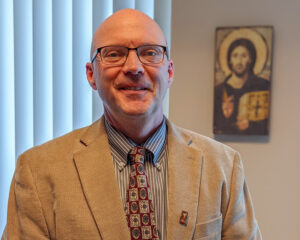
By David Spesia
Guest Commentary
Like many people, I had struggled for years to create a regular habit of receiving the sacrament of reconciliation. I had heard the recommendation about making time for a monthly confession, but I could always find excuses to put it off -- a typical “wait till next week” mentality.
However, that all changed about 15 years ago when I was on a retreat. I knew that this was my opportunity to make a good confession. The “wait till next retreat” temptation did not seem very convincing.
There were two priests available that day as my fellow retreatants and I inched forward. While waiting, I found myself really hoping that I would have the opportunity to go to the wise older priest whose homilies I had been enjoying, rather than the young priest who I had decided was not particularly impressive.
Needless to say, this was not the most appropriate thing to be pondering in preparation for my confession, and I felt a little bad about it even as I really hoped to get the wise older priest.
As Providence would have it, I wound up with the young priest.
After I made my confession, what followed was a complete shock. From the mouth of this priest came words that only the divine Word could have spoken. Straight to my heart, there was tender mercy, delivered without limit; there was other-worldly advice about root causes of my specific sins, and above all, there was absolute reassurance about my deepest identity: I was a beloved son of the Father.
I had long understood that the priest’s power to forgive sins comes directly from the risen Lord’s gift to the apostles: “Receive the holy Spirit. Whose sins you forgive are forgiven them, and whose sins you retain are retained” (Jn 20: 23). I knew that only God could forgive sins, and it made sense that, if the Son of God had bestowed such authority on mere mortals, this was a gift that I should receive with gratitude.
But I had never stopped to consider that the words of the priest in the confessional could be Jesus’ words, meant directly for me.
Since that uniquely graced moment, each month when I return to confession for a spiritual “fresh start,” I ask the Holy Spirit to help me hear what I need to hear. Sometimes, it is a key phrase or word from the Scriptures that the priest references. Often, it is simply the beautiful message of absolution from the sacramental rite:
“God, the Father of mercies, through the death and resurrection of his Son, has reconciled the world to himself and poured out the Holy Spirit for the forgiveness of sins; through the ministry of the Church may God grant you pardon and peace. And I absolve you from your sins, in the name of the Father, and of the Son, and of the Holy Spirit. Amen.”
I have come to think of these words of absolution as a love letter from the Lord, reminding me that I am never defined by my failures and that I am always, first and foremost, beloved.
They reaffirm that Jesus died for me as well as for the whole world. They compel me to be more open to his grace so that I might respond by living each day for the Lord. They restore me to friendship and intimacy with the Blessed Trinity -- that Communion of Persons who is Love -- and they strengthen my communion to all of God’s other beloved children.
They also make me more receptive to the full mystery of the Eucharist in the life of the Church.
When my easily wounded pride might try to keep me away from regular reconciliation, I remind myself of Peter’s response to Jesus after people began to turn away from His Eucharistic teaching in the sixth chapter of John’s Gospel: “Master…You have the words of eternal life” (Jn 6:68). Even though Peter did not fully comprehend the mystery, he understood what was essential: When Jesus speaks, love happens.
- - -
David Spesia is the executive director of the secretariat of evangelization and catechesis for the United States Conference of Catholic Bishops.
